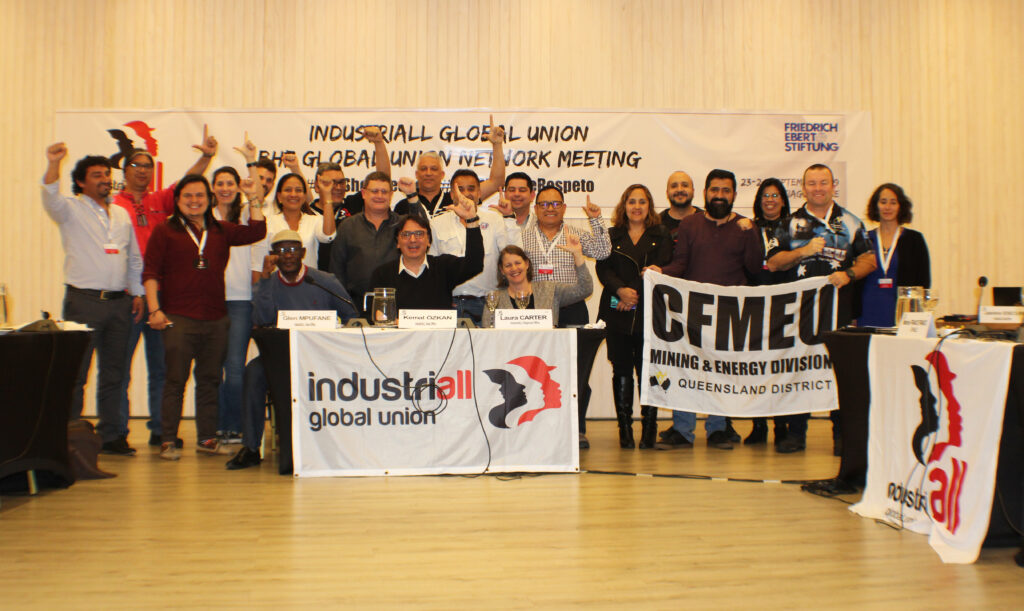13 November, 2019BHP is a world-leading company in the minerals, oil and gas sectors, claiming to "to gather people and resources together to build a better world." But according to their workers around the world, they have a long way to go to achieve their objective.
Text: Kim Meyer, Laura Carter
BHP has been in the eye of the storm for five years, due to one of the worst environmental disasters in Brazil’s history, when the Samarco tailings dam broke on 5 November 2015 in Mariana, Minas Gerais. The tailings dam belonged to Samarco Mineração, a joint venture between two of the world’s biggest mining companies, Australia’s BHP and Brazil’s Vale SA.
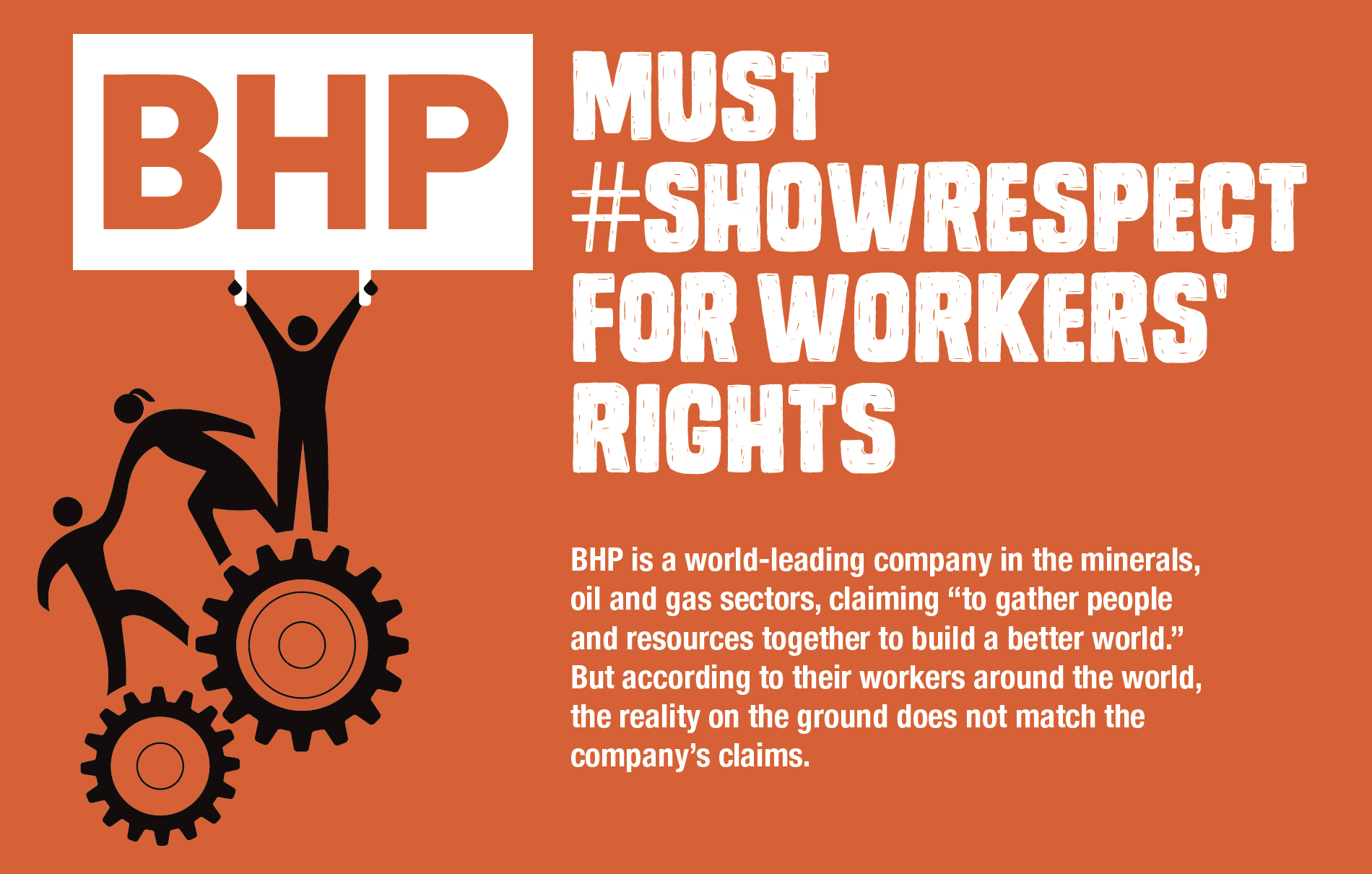 Nineteen people died in the tragedy, 700 families lost their homes and more than 2,000 workers in the mining, construction, commerce, electricity and agriculture sectors lost their jobs.
Nineteen people died in the tragedy, 700 families lost their homes and more than 2,000 workers in the mining, construction, commerce, electricity and agriculture sectors lost their jobs.
The collapse of the tailings dam unleashed a deluge of toxic sludge, spilling over the Dolce river, a source of drinking water in southern Brazil, obliterating towns along the stretch as the wave of mud travelled kilometres down the river into the Atlantic ocean.
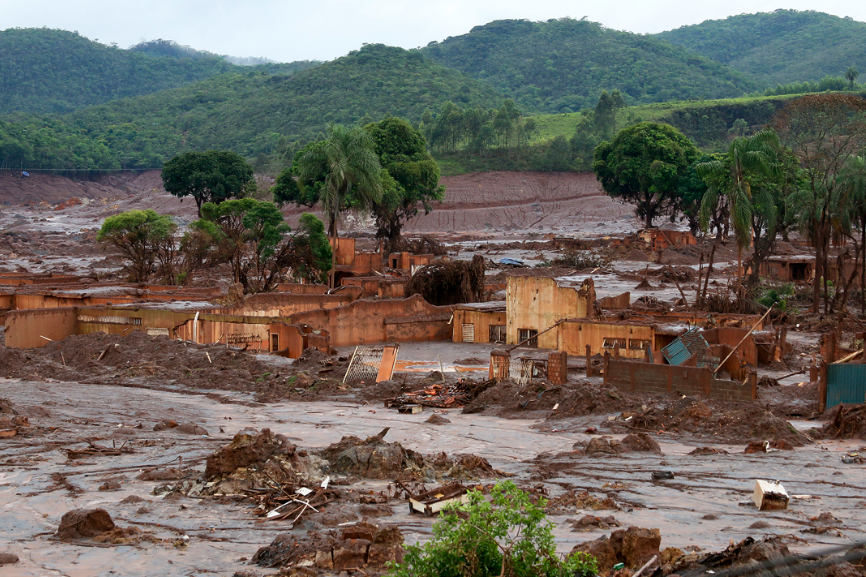
The aftermath of the Samarco dam failure in Brazil
What are tailings dams?
No one ever hears about tailings dams until they go wrong. But when they fail, the results can be catastrophic. So, as their numbers increase, what exactly are tailings dams and why should we be worried?
In 2018, the Building and Wood Workers’ International (BWI) and IndustriALL Global Union filed a complaint against BHP and Vale S.A., under the OECD Guidelines for Multinational Enterprises. The specific complaint sought to address the conditions that contributed to the collapse of the tailings dam, in particular the extensive use of outsourcing, failure to respect the collective bargaining agreement, violations of trade union rights and inadequate health and safety.
Trade union representatives from IndustriALL’s BHP global network from Australia, Brazil, Canada and Colombia met in London in October 2018, together with the London Mining Network, to address the rampant violations of union and human rights, as well as environmental destruction. The network took the issues to BHP’s annual general meeting, demanding accountability from shareholders and justice for the victims of the Samarco disaster, and remediation of the environment.
IndustriALL launches a global campaign against BHP

Demonstration at BHP's AGM in October, 2019
Marcelo Franco in front of BHP's annual general meeting in London, October 2019
Following the tragedy of the Samarco tailings dam in 2015 and failed attempts to establish global dialogue with BHP, IndustriALL’s Executive Committee agreed in 2018 to launch a campaign against BHP.
Kemal Özkan“Why a global campaign? Because the same practices exist in all of BHP’s operations: a policy of outsourcing to cut labour costs and a disrespect for the fundamental rights of its workers and communities.
"There have been crimes against the environment and there are risks of new ones happening. We continue this campaign for the dignity of BHP workers and those who died in mining accidents,”
IndustriALLassistant general secretary Kemal Özkan made these comments during the BHP network meeting in Santiago, Chile, in September 2019.
Outsourcing and loss of rights
BHP is the world’s largest mining company in terms of its market capitalization, valued at just under US$100 billion. The workforce has been significantly affected by one of the main elements of BHP’s strategy to boost labour productivity; outsourcing employment. The result is a very high proportion of temporary employment through the use of precarious contracts.
In 2018, BHP reduced its labour costs by 23 per cent and achieved a 29 per cent increase in material moved per employee. From 2000 to 2014, outsourcing increased exponentially. Figures from the company’s 2019 Sustainability Report show that contractors constitute 60 per cent on average of BHP’s global workforce.
In terms of BHP operated assets, the 2018 Sustainability Report figures state that in Australia it has 16,504 permanent employees and 21,267 subcontractors, that means that 56.3 per cent of its workers are outsourced.
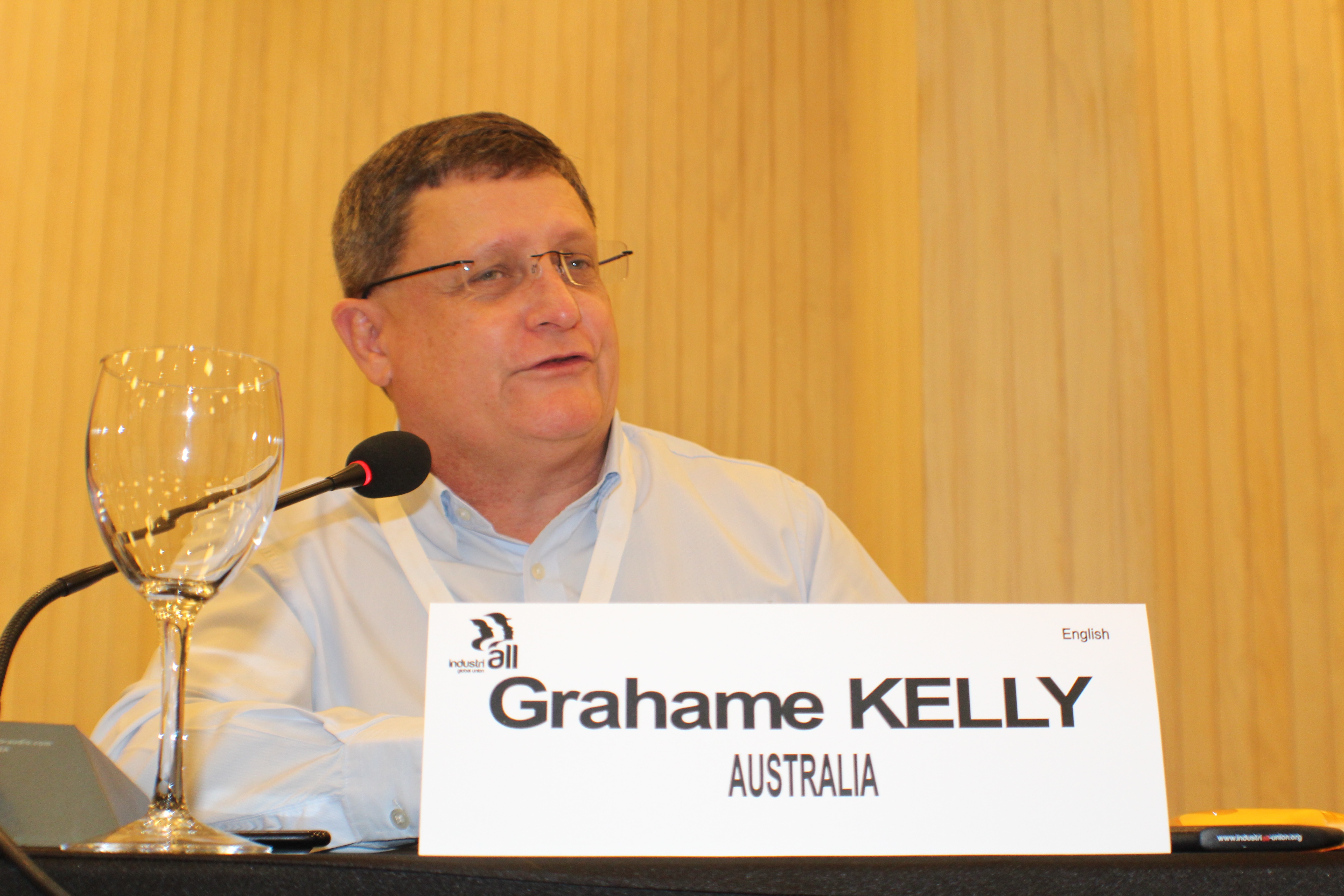
"There are examples in Australia where they have not employed a permanent worker … in more than 7 years.”
Graham Kelly
IndustriALL Australian affiliate CFMEU Mining and Energy national secretary Graham Kelly says:
“There are 450 permanent workers at the BHP mine in Queensland, 95 per cent of whom are unionized. In addition there are 6,300 workers hired on a temporary basis, who earn 30 or 40 per cent less than the permanent workers.
"From the point of view of unionized workers, it is very difficult to carry out collective bargaining for improvements because there is already a workforce that is outside the equation. In addition, there are examples in Australia where they have not employed a permanent worker in a BHP mine in more than 7 years.”
In Chile, BHP has 6,729 permanent employees and 12,521 subcontractors, i.e. 65 per cent of its workers are outsourced. BHP has an extremely high labour turnover, since subcontractors are considered a second-class workforce. It is also almost impossible for these workers to form a union because they are employees of different contracting companies, and it is difficult for them to exercise their union rights.
The president of the union Patricio Tapia at the BHP Escondida mine in Chile says:
“Chilean legislation unfortunately prevents subcontracted workers from making use of the right to strike, because it states that if they do strike, the company can replace them.”
In the case of the Cerrejón mine in Colombia, which is part-owned by BHP, outsourced workers far outnumber those with permanent contracts.
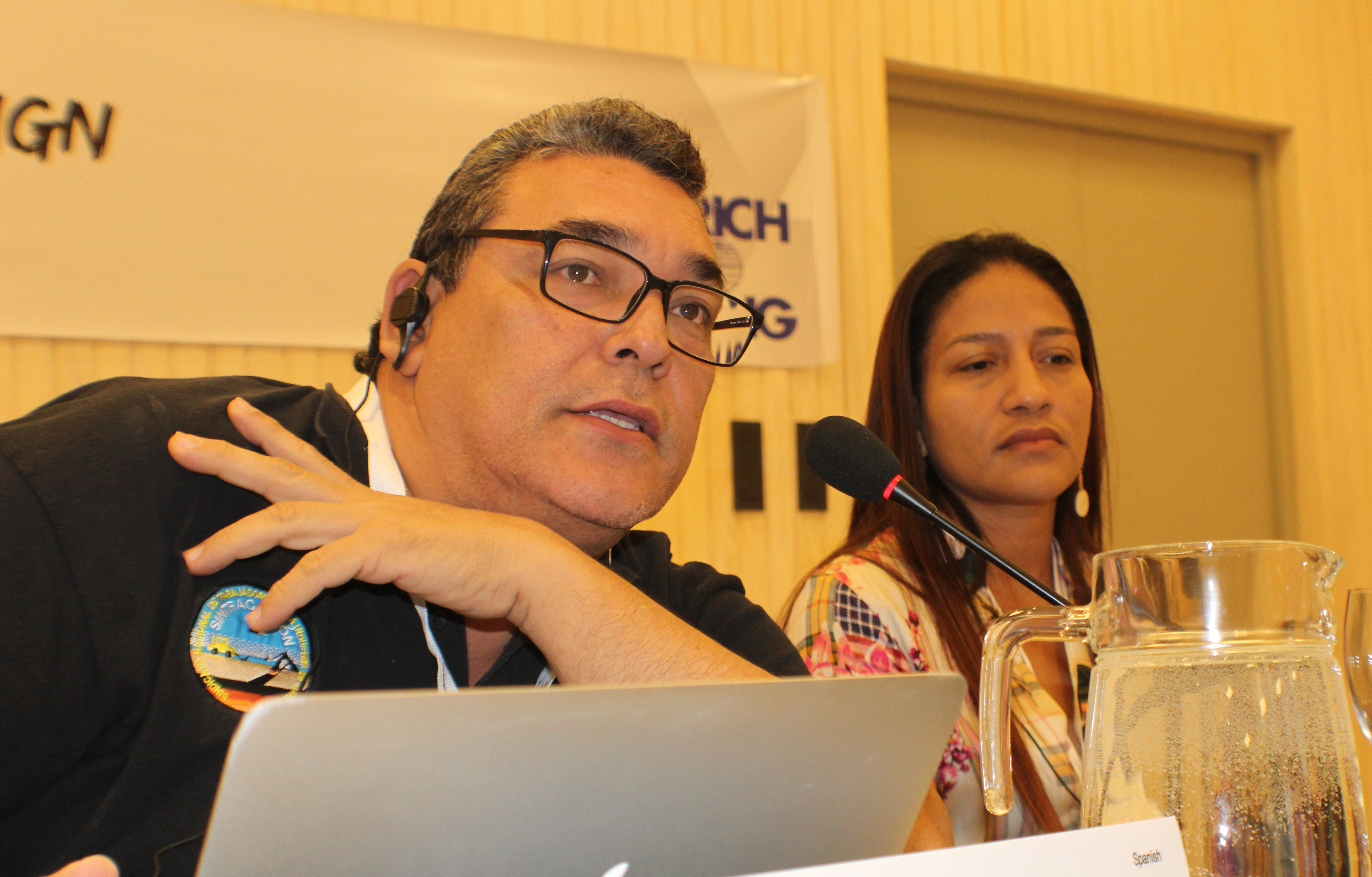
“Out of a total of 12,000 workers, only
5,000 have permanent contracts"
Igor Díaz
Igor Díaz, president of IndustriALL affiliate Sintracarbón“Out of a total of 12,000 workers, only 5,000 have permanent contracts; the rest are outsourced. Outsourced labour is subject to precarious conditions of work, and they do not earn a large salary. But we have managed to affiliate these workers and improve their working and social conditions,”
In Chile, BHP workers in the Escondida mine went on strike for 44 days in 2017 after the company refused to negotiate in good faith with its workers. The union was asking the company to discard its plans which involved reducing wages, increasing working hours, and discriminating between long-standing and new employees.
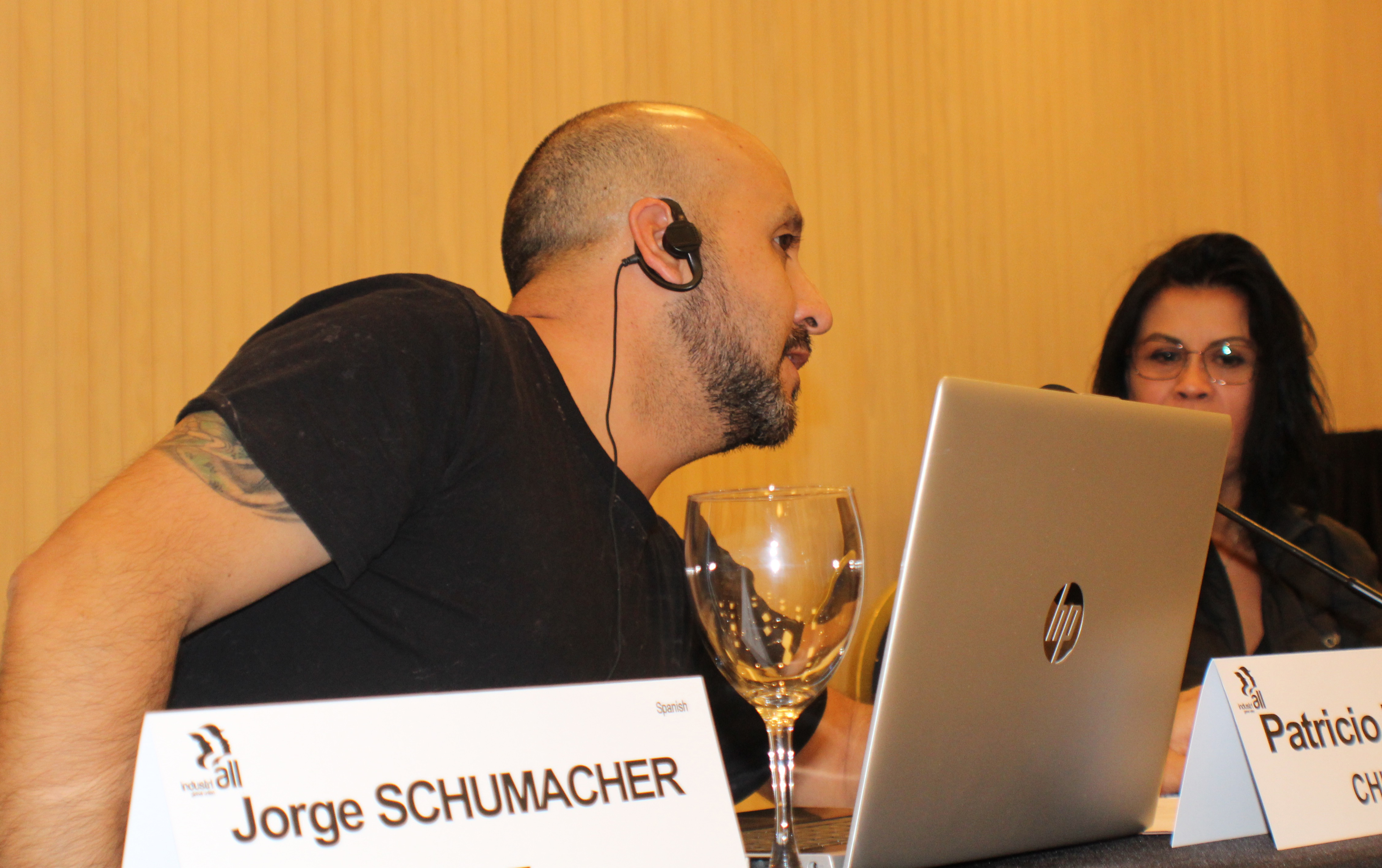
“We are proud of the strike against BHP."
Jorge Schumacher
“We are proud of the strike against BHP because it proved to us that we have a strong union ready to fight. We have one of the best collective bargaining agreements for miners in Chile,”
says Jorge Schumacher from the union in the Escondida mine.
Unions at BHP operations have said that the company often has an anti-union attitude and refuses to engage in collective bargaining. CFMEU in Australia claims that the company uses an island strategy with the unions, i.e. avoiding trade unions and turning union members into an island in a sea of non-unionized workers. Instead, BHP often prefers their prerogative as management at the expense of consultation and negotiation with the unions.
Poor Health and Safety
Health and safety continues to be a problem in BHP’s operations. The coordinating committee for BHP unions in Chile said that they face longer working hours than what the law allows and a lack of transparency in how bonuses are calculated. In addition, in Cerro Colorado, doctors are under pressure not to identify work-related injuries.
Marcelo Franco, of Union 1 CMCC in Cerro Colorado, says:
“Health and safety conditions are very poor. Workers have problems with shoulders, arms, hands and the spine. One colleague injured her arms and the doctor gave her medical leave due to work-related illness. But upon receiving a call from the company he immediately cancelled the certificate, telling her the problem was the result of a congenital malformation.”
Meanwhile, workers at Minera Spence operations, owned by BHP in Chile, report on health problems due to toxic gas emissions produced by the company.
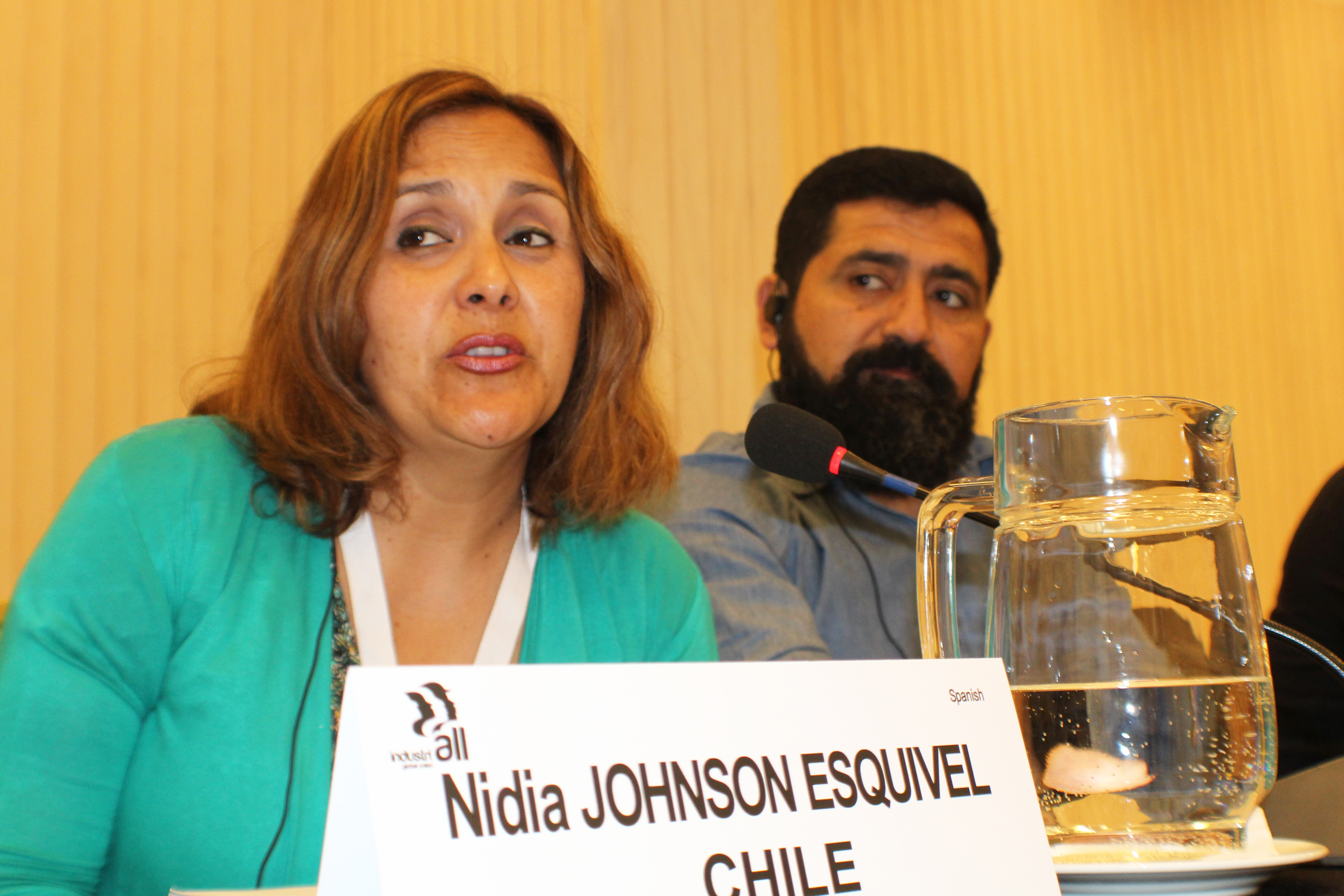
"Workers suffered gastric poisoning from hydrochloric acid emissions.”
Nidia Johnson Esquivel
“To speed up the process of obtaining copper from leaching basins, sodium chloride is added. When coupled with sulphuric acid, this results in high emissions of hydrochloric acid. As a union we had to go to the regional secretariat of the Ministry of Health (Seremi) to make the request for inspection of gas emissions.
“Seremi told BHP that without the appropriate equipment to curb these emissions they would have to stop until there was improvement. Seremi also requested environmental and nutritional reports because workers had suffered gastric poisoning from hydrochloric acid emissions,”
says Nidia Johnson Esquivel from Minera Spence.
In 2017, a parliamentary investigation in Australia found that there had been a failure on almost all levels of the regulatory system designed to protect workers. The committee identified serious failures in industry-led health examinations, from poor X-ray readings to poorly executed lung tests and unqualified personnel.
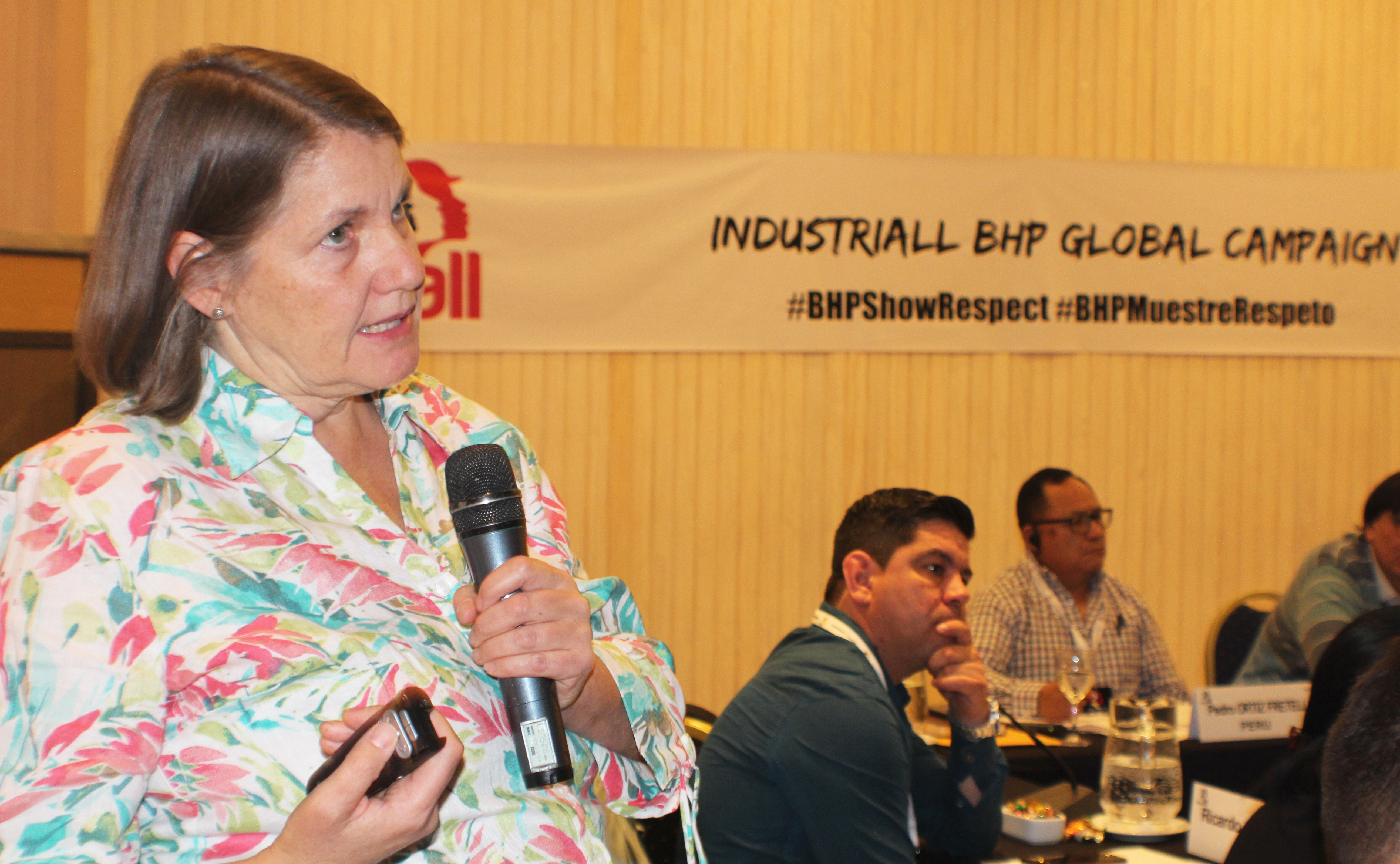
"BHP workers affected by black lung disease were denied a meeting with the company."
Laura Carter
“One worker said it took two and a half years, three specialists and several doctors to get an official diagnosis. Doctors told him he had bronchitis, and he continued to work underground in dusty conditions while his condition remained unidentified. In March this year, BHP workers affected by black lung disease were denied a meeting with the company,”
says Laura Carter, IndustriALL assistant regional secretary.
Industry 4.0 and the need for a Just Transtion
BHP wishes to transform all its operations through the application of technology by 2025, implementing mining technologies to improve productivity, producing zero damage and lowering the structural cost of mining operations. BHP’s goal is to reduce human labour to a minimum.
In some of its operations it has already begun to make technological innovations. For example, in Pilbara, Australia, operations are carried out from Perth, Australia. Operations in Spence, located in Chile’s Atacama desert, are run from Santiago. Workers say that in the case of Spence, BHP failed to mention in the negotiations that they were planning to relocate the control centre to Santiago.
BHP has an overall plan to invest
US$3 billion to reduce costs through the use of technology in Australia, announcing plans to spend just under US$800 million on adding 500 autonomous trucks to their fleet in Pilbara. If BHP goes ahead, these will be rolled out over the next three years, and the new lorries will be deployed in the iron mines of Western Australia, and later in the coal mines in Queensland. BHP largely refuses to consult or negotiate with workers on these issues.
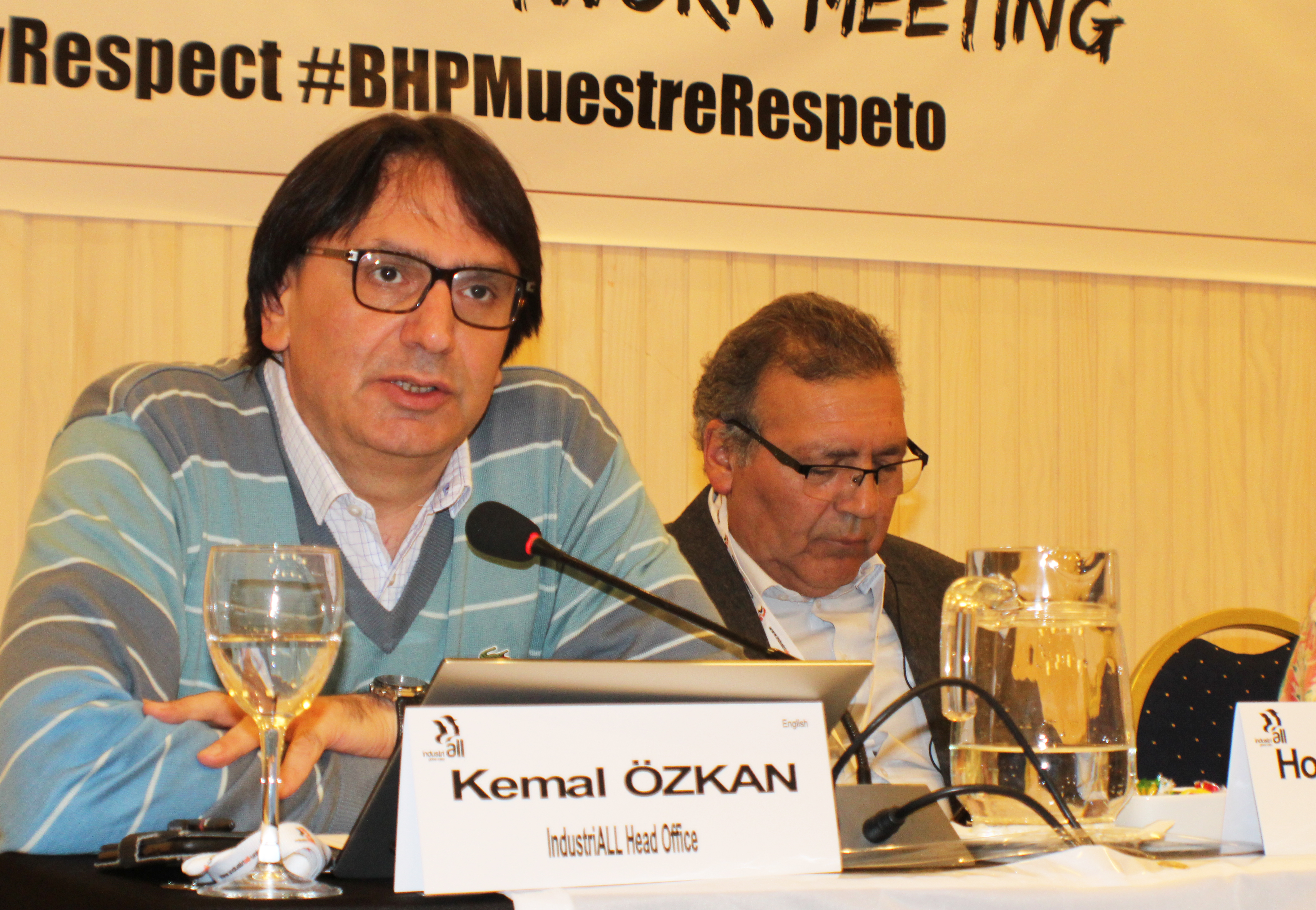
“As IndustriALL, we will fight for the transformation to be fair."
Kemal Özkan
“As IndustriALL, we will fight for the transformation to be fair. We need a series of strategies and actions, especially in the face of multinationals like BHP that don’t respect workers’ rights,”
says Kemal Özkan, IndustriALL assistant general secretary.
In Colombia, the franchise for mining in Cerrejón expires in 2034. According to the unions, BHP has yet to disclose a plan for the closure, causing great uncertainty for the workers and the population of La Guajira, which depends on Cerrejón for its economy.
Igor Díaz, from Sintracarbón, says:
“According to Colombian legislation, a decommissioning project must be defined 20 years before closing the mine, which has not happened. The government should provide alternative work for the 12,000 workers who will be affected, as well as for the region that is dependent on the mining operations.
“With the support of IndustriALL, the FNV in the Netherlands and the IGBC in Germany, we have held forums on energy transition to explain how these countries undertook the transition from coal. Unions, companies and governments took part in these discussions.
“The situation is complex for all workers, but mainly for outsourced workers who do not belong to a trade union. We want a Just Transition for them as well.”
Although BHP claims to be committed to making a “positive contribution to society”, with a “responsible and ethical business” and that it wants to “work with society to create a sustainable future,” it seems it must try harder.
Colombia’s Cerrejón mine is located in a dry region, with only one river, called Ranchería, crossing through the middle of the mine. BHP wanted to move the river as there are 500 million tons of top quality coal underneath it. The move was opposed by Sintracarbón and the local communities.
“Faced with opposition, the relocation of the riverbed was suspended. But the project, called P500, had already been designed and huge investments had been made, and instead an important tributary of the river, called Bruno, was diverted,”
says Igor Díaz of Sintracarbón, Colombia.
In Brazil, after the collapse of the Mariana dam in 2015, the communities say that BHP still has an awful lot to do to remedy all the damage it caused.
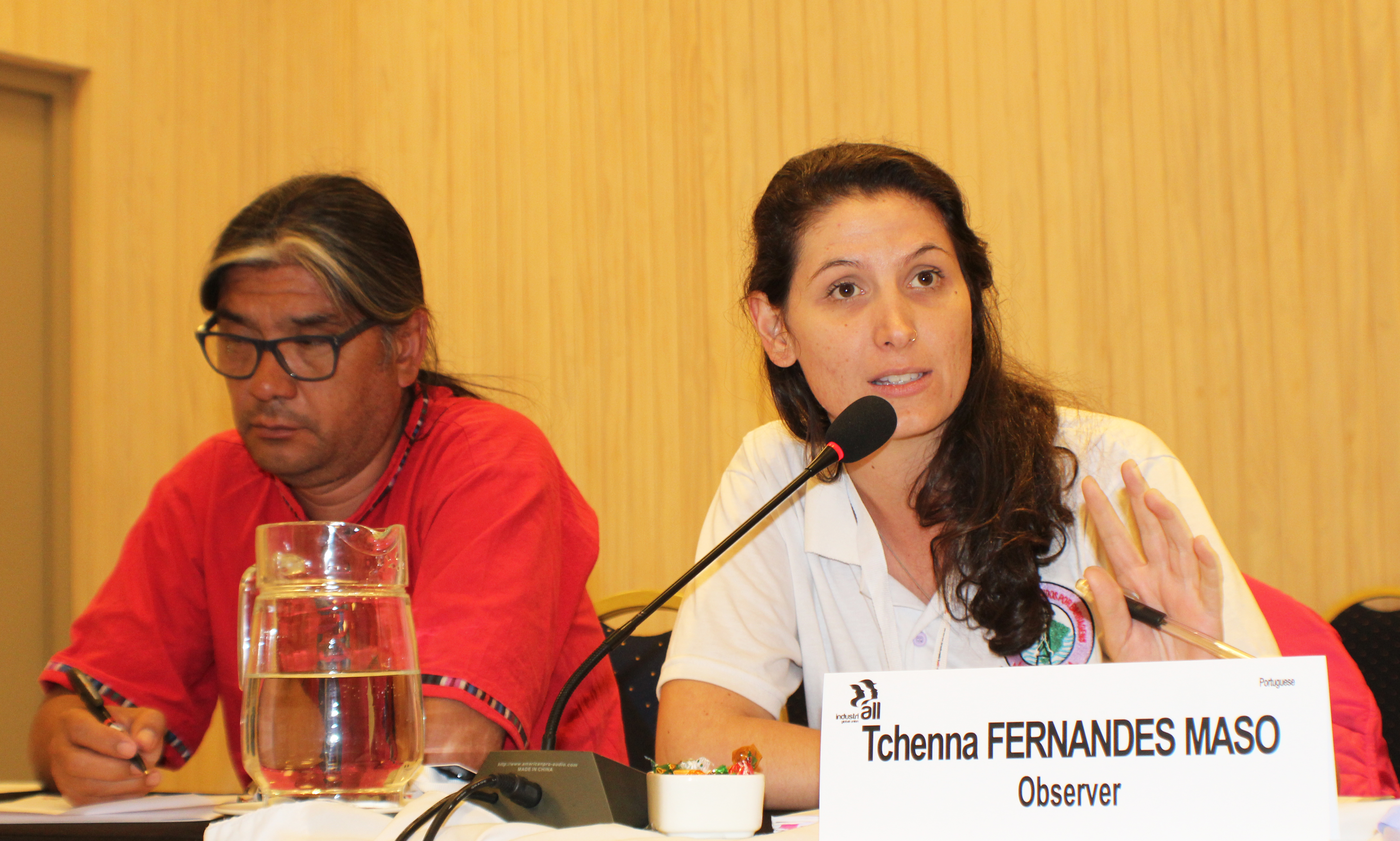
“Four communities were totally destroyed by the mud and not a single house has been rebuilt."
Tchenna Maso
Tchenna Maso, member of the Movement of those Affected by Dams (Movimento dos Atingidos por Barragens – MAB), says:
“Four communities were totally destroyed by the mud and not a single house has been rebuilt in the four years since the tragedy. The environmental damage is huge and we are engaged in a court fight to achieve recognition of the contamination.
“In addition, women are not recognized as affected by the disaster. Social contributions are usually made by men, the breadwinners, and women have informal jobs. So there is no way to prove that they lost their jobs. Only 15 per cent of women are recognized as breadwinners. The companies have effectively taken away women’s financial autonomy.”
Gender balance by 2025: Reality or Utopia?
BHP wants to achieve gender balance by 2025. Currently, 80.19 per cent of BHP employees are men and 19.81 per cent women.
Women with permanent contracts represent a disproportionately small part of the BHP workforce in South America and Australia. In South America, 85.34 per cent are men, but only 14.66 per cent of those are women. In Australia, 80.30 per cent are men and 19.70 per cent are women.
Women represent a small percentage of those working as operators and in general support services, and a disproportionately small percentage of full-time employees. Women earn less than men at all levels in BHP, and the discrepancy is most noticeable among operators and general support staff.
It is to fight for a Just Transition for both permanent and subcontracted BHP workers, and to defend safer and fairer labour practices in all of the company’s operations, that IndustriALL reaffirms its campaign against BHP and insists on the following:
- That BHP engage in meaningful dialogue with trade unions worldwide
- That the company take responsibility at global level for the treatment of workers at the local level
- That the company adopt a less antagonistic and less oppressive approach to workers and industrial relations
- That the company should not oppose the formation and growth of trade unions
